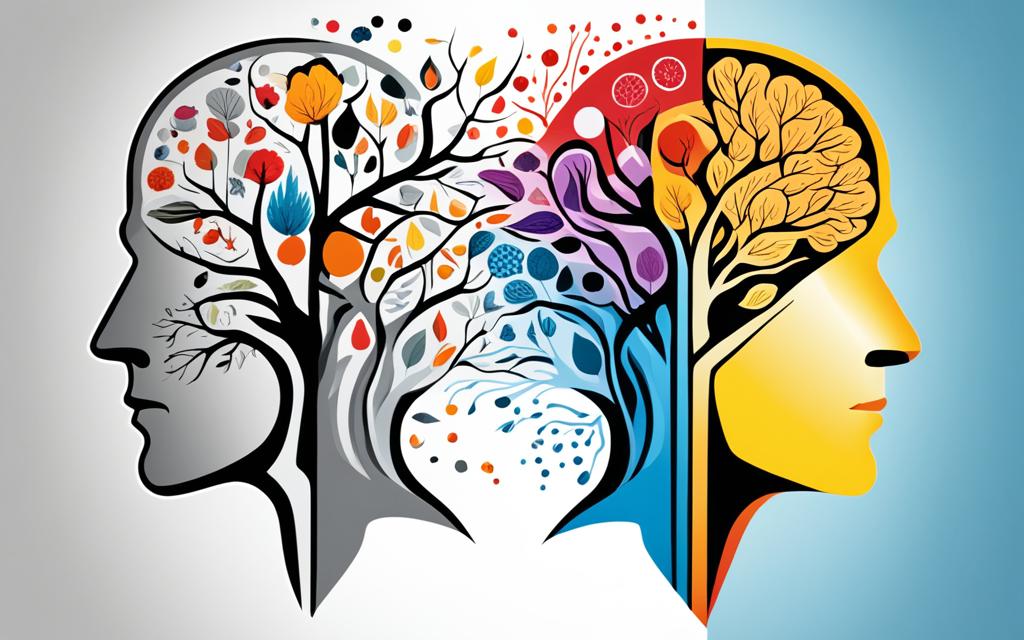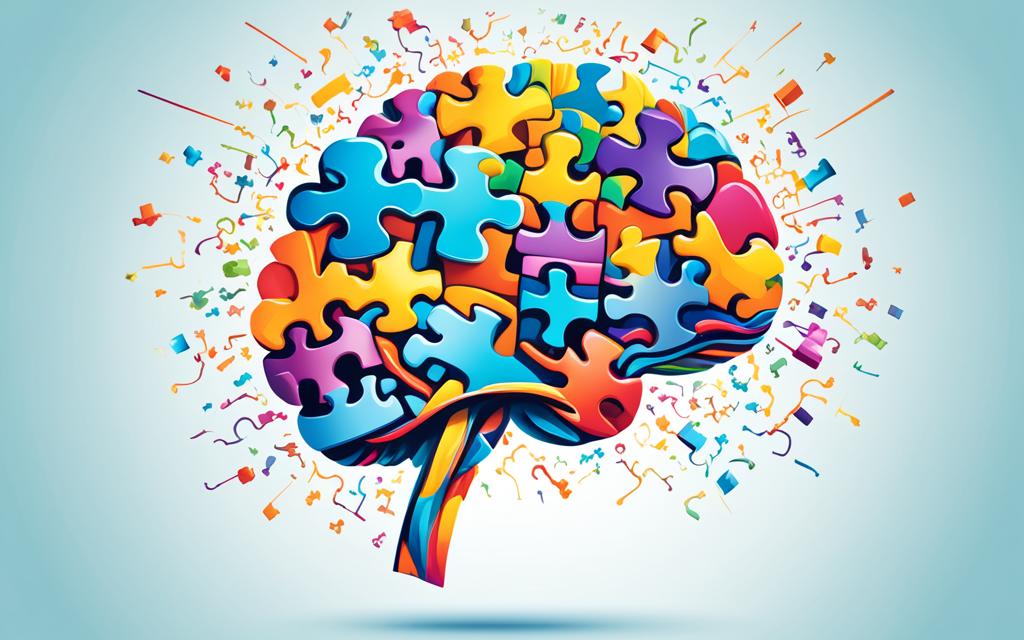Understanding What is Psychology – A Basic Guide
Welcome to our comprehensive guide on psychology. In this article, we will explore the fascinating field of psychology and provide you with a basic understanding of what it is all about. Psychology is the scientific study of the mind, behavior, and the factors that influence them. It delves into the complex workings of the human mind, exploring how thoughts, emotions, and behaviors shape our experiences.
Psychology encompasses a wide range of topics, from understanding the development of personality and cognition to exploring mental health and social interactions. By studying psychology, we gain valuable insights into why people think, feel, and behave the way they do.
Key Takeaways:
- Psychology is the scientific study of the mind, behavior, and the factors that influence them.
- It helps us better understand human experiences, emotions, cognition, and social interactions.
- Psychology has practical applications in various areas of life, including education, therapy, business, sports, and personal development.
- Psychological research plays a crucial role in expanding knowledge and addressing real-world problems.
- The field offers various branches and specializations, such as clinical psychology, cognitive psychology, and social psychology.
Defining Psychology
To truly understand the complexities of human behavior and the workings of the mind, we turn to the field of psychology. So what is psychology? At its core, psychology is the scientific study of the mind, behavior, and the interplay between them. By investigating the psychological processes that shape our thoughts, emotions, and actions, psychologists strive to gain insights into human nature.
Psychology definition:
Psychology is the scientific study of the mind and behavior, exploring the intricate mechanisms that underlie our thoughts, feelings, and actions.
Psychologists explore a wide range of topics, from personality and development to cognition and social interactions. They employ various research methods to gather data, such as experiments, surveys, and observations, enabling them to analyze and interpret human behavior from different angles. Through their research, psychologists aim to uncover patterns, understand motivations, and provide valuable insights into human experiences.
How psychology focuses on the mind, behavior, and their influencing factors:
- Mind: Psychology delves into the processes that occur within the mind, including perception, memory, attention, and consciousness. By understanding how the mind operates, psychologists gain insights into how individuals perceive the world and make sense of their experiences.
- Behavior: One of the primary focuses of psychology is studying human behavior. Psychologists examine the actions, reactions, and responses of individuals in various contexts to analyze their patterns and underlying motivations.
- Factors that shape them: Psychology recognizes that the mind and behavior are shaped by a multitude of factors, including genetics, environment, culture, and personal experiences. By considering these influencing factors, psychologists gain a more holistic understanding of why individuals think, feel, and behave the way they do.
Psychology is a dynamic and evolving field, shedding light on the intricacies of human nature and its impact on various aspects of life. From guiding mental health interventions to informing educational practices, psychology provides valuable insights that contribute to personal growth, societal understanding, and the pursuit of well-being.
Exploring the Basics of Psychology
In this section, we will delve into the fundamental principles and theories that lay the groundwork for the field of psychology. By understanding these psychology basics and fundamentals, you will gain a broader perspective on the intricate workings of the human mind and behavior.
Psychology, at its core, is the scientific study of the mind, behavior, and the factors that shape them. It aims to unravel the complexities of human nature, shedding light on why we think, feel, and act the way we do.
One of the key theories in psychology is the psychoanalytic theory proposed by Sigmund Freud. He believed that human behavior is determined by unconscious desires and conflicts. Freud’s ideas sparked a revolution in the field and paved the way for the development of various other psychological theories and approaches.
Psychology also encompasses the study of cognitive processes, which involves examining how we perceive, think, and remember information. The cognitive perspective emphasizes the importance of mental processes in understanding human behavior.
“The mind is what the brain does.” – Marvin Minsky, American cognitive scientist
Behaviorism, another influential school of thought in psychology, focuses on observable behavior and the environmental factors that influence it. Psychologists like Ivan Pavlov and B.F. Skinner conducted experiments that explored how conditioning and reinforcement can shape behavior.
The table below provides an overview of some key psychology basics:
| Psychology Basics | Description |
|---|---|
| Psychological Perspectives | Analyze behavior and mental processes from various viewpoints, including biological, psychodynamic, cognitive, behavioral, and humanistic perspectives. |
| Research Methods | Investigate psychological phenomena using methods such as experiments, surveys, observations, and case studies. |
| Developmental Psychology | Study how individuals grow and change across their lifespan, examining physical, cognitive, and socioemotional development. |
| Learning and Memory | Explore how we acquire, retain, and retrieve information, including classical and operant conditioning, as well as memory processes. |
Understanding these psychology basics and fundamentals is essential for anyone interested in this intriguing field. It provides a strong foundation for further exploration of specific psychological concepts, theories, and applications.
Now that we have covered the basics, let’s move on to exploring key psychological concepts in the next section.
Key Psychological Concepts
In the field of psychology, various concepts play a crucial role in understanding human behavior and the complexities of the mind. Let’s explore some of the key psychological concepts that shape our thoughts, actions, and experiences:
1. Conditioning
Conditioning refers to the process by which we learn and respond to particular stimuli based on the consequences associated with them. This concept can be divided into two types: classical conditioning and operant conditioning. Classical conditioning involves associating a neutral stimulus with a naturally occurring response, while operant conditioning focuses on reinforcing or punishing behaviors to influence future actions.
2. Perception
Perception involves how we interpret and make sense of the information received through our senses. It encompasses the way we perceive and organize sensory stimuli, such as vision, hearing, taste, touch, and smell. Our perception influences our understanding of the world and affects our thoughts, emotions, and behaviors.
3. Memory
Memory is the process of encoding, storing, and retrieving information. It plays a vital role in our daily lives, allowing us to retain experiences, knowledge, skills, and events. Memory can be categorized into three main types: sensory memory, short-term memory, and long-term memory. Each type has its own duration and capacity, contributing to our ability to learn and recall.
4. Motivation
Motivation refers to the internal and external factors that drive our behavior and actions. It is what compels us to strive for goals, seek rewards, and fulfill needs. Motivation can stem from various sources, such as biological, psychological, and social factors, influencing our level of productivity, perseverance, and achievement.
5. Learning
Learning is the process of acquiring new knowledge, skills, behaviors, or attitudes through experience, study, or instruction. It encompasses both intentional and unintentional learning and can occur through various methods, such as observation, imitation, practice, and reinforcement. Learning plays a fundamental role in shaping our abilities and shaping our personal and social development.
Understanding these key psychological concepts provides valuable insights into human behavior and mental processes. As we explore further, we’ll see how these concepts intertwine and contribute to our understanding of the mind and behavior.
| Concept | Description |
|---|---|
| Conditioning | The process of learning and responding to particular stimuli based on associated consequences. |
| Perception | The interpretation and organization of sensory information received through the senses. |
| Memory | The encoding, storage, and retrieval of information. |
| Motivation | The internal and external factors that drive behavior and actions. |
| Learning | The acquisition of knowledge, skills, behaviors, or attitudes through experience or instruction. |
The Influence of Psychology on Human Experience
Psychology plays a crucial role in shaping our understanding of the human experience, encompassing various aspects of our lives, including emotions, cognition, social interactions, and mental health. By studying the intricacies of the human mind and behavior, psychology provides invaluable insights into what drives us, how we perceive the world, and why we behave the way we do.
One of the key areas where psychology contributes is in unraveling the complexities of human emotions. Emotions play a significant role in our daily lives, influencing our decision-making, relationships, and overall well-being. By examining emotional processes and their underlying mechanisms, psychology helps us comprehend how emotions are experienced, expressed, and regulated.
Cognition, or the processes involved in acquiring knowledge and understanding, is another focal point of psychology. It explores how we think, remember, reason, solve problems, and make decisions. Through cognitive psychology, we gain a deeper appreciation for our cognitive abilities and how they shape our perceptions, beliefs, and actions.
“The mind is like an iceberg, it floats with one-seventh of its bulk above water.” – Sigmund Freud
Social interactions and relationships are fundamental aspects of human experience. Psychology provides us with a framework to comprehend the complexities of social behavior, including how individuals form and maintain relationships, influence one another, and navigate social dynamics. By studying social psychology, we gain insights into the impact of social factors on our attitudes, beliefs, and actions.
Furthermore, psychology plays a crucial role in understanding and addressing mental health issues. By studying the causes, symptoms, and treatment of psychological disorders, psychologists and mental health professionals contribute to improving the well-being and quality of life for individuals experiencing mental health challenges.
Overall, psychology offers a comprehensive overview of the human experience, shedding light on the intricate workings of the mind, behavior, and the interplay between individuals and their environment. By delving into various domains such as emotions, cognition, social interactions, and mental health, psychology equips us with a deeper understanding of ourselves and those around us.

Applying Psychology in Everyday Life
Now that you have a basic understanding of psychology and its key concepts, it’s time to explore how this knowledge can be applied in your everyday life. Psychology is not only an academic field but also a practical one that can enrich your personal and professional experiences.
Let’s take a closer look at some of the areas where psychology plays a significant role:
Educational Settings
In education, psychology helps teachers understand how students learn and develop. By applying psychological principles, educators can create effective teaching strategies, design engaging learning environments, and tailor their instruction to meet individual student needs.
Therapy and Mental Health
Psychology forms the foundation of various therapeutic approaches and interventions. Therapists use psychological theories and techniques to help individuals navigate through emotional challenges, manage stress, develop coping mechanisms, and improve their overall mental well-being.
Business and Organizations
Psychology plays a crucial role in understanding human behavior and driving business success. Companies use psychological insights to enhance employee motivation, improve team dynamics, optimize workflow, and create a positive work culture. Psychology is also used in marketing and consumer behavior analysis to understand customer preferences and develop effective advertising strategies.
Sports Performance
Psychology plays a significant role in sports performance. Sports psychologists work with athletes to enhance their mental resilience, manage performance anxiety, set goals, and improve focus and concentration. By applying psychological techniques, athletes can strengthen their mental game and achieve peak performance levels.
Personal Development
Psychology knowledge can empower individuals to develop self-awareness, self-confidence, and personal growth. By understanding psychological principles, you can gain insights into your own behavior, emotions, and thought processes, enabling you to make positive changes and achieve personal goals.
As you can see, psychology knowledge can be applied to various aspects of life, helping you gain a deeper understanding of yourself and others. By utilizing psychology in practical ways, you can enhance your relationships, improve decision-making, and lead a more fulfilling life.
The Importance of Psychological Research
Psychological research plays a vital role in expanding our understanding of the human mind and behavior. Through rigorous scientific investigation and analysis, researchers uncover valuable insights that contribute to solving real-world problems and improving our lives. Let’s explore the significance of psychological research in more detail.
Advancing Knowledge: Psychological research helps us gain a deeper insight into the complexities of human behavior. By conducting experiments, surveys, and observations, researchers generate valuable data and theories that enhance our understanding of various psychological phenomena. This knowledge forms the foundation for developing evidence-based practices, interventions, and treatments.
Addressing Real-World Problems: Psychological research addresses pressing social issues and problems by providing evidence-based solutions. By studying topics such as mental health, human relationships, cognitive processes, and organizational behavior, researchers can identify effective strategies to tackle challenges and improve individual and societal well-being.
“Research is to see what everybody else has seen, and to think what nobody else has thought.” – Albert Szent-Gyorgyi
Informing Policy and Decision-Making: Psychological research findings are instrumental in shaping policies and driving positive change. Policymakers and decision-makers rely on scientific evidence to implement interventions, programs, and regulations that promote mental health, educational reforms, workplace well-being, and more.
Validating Psychological Theories: Research allows us to test and validate existing psychological theories. By replicating experiments and conducting large-scale studies, researchers can confirm or challenge previous findings, leading to the refinement and advancement of psychological theories and concepts.
Contributing to Cross-Disciplinary Collaboration: Psychological research transcends traditional boundaries and collaborates with various disciplines such as neuroscience, sociology, and medicine. This interdisciplinary approach stimulates innovation, fosters collaboration, and generates holistic insights into human behavior and cognition.
To illustrate the impact of psychological research, consider the following table that showcases key breakthroughs in the field:
| Breakthrough | Impact |
|---|---|
| The Stanford Prison Experiment | Revealed the power of social roles in influencing behavior and ethics |
| Positive Psychology Movement | Promoted a focus on well-being, flourishing, and positive attributes |
| Cognitive-Behavioral Therapy (CBT) | Effective treatment for a wide range of mental health conditions |
| Milgram Experiment | Demonstrated the influence of authority figures on human obedience |
Psychological research plays a crucial role in advancing our understanding of human behavior, informing policies, and addressing societal challenges. Its scientific rigor and evidence-based approach provide a solid foundation for cultivating a healthier, more resilient, and compassionate world.
Specializations in Psychology
Psychology is a diverse field with numerous specializations that delve deep into various aspects of human behavior and the mind. These specializations enable psychologists to focus their expertise and apply their knowledge to specific areas of interest. Let’s explore some of the prominent branches of psychology:
Clinical Psychology
Clinical psychology involves the assessment, diagnosis, and treatment of individuals experiencing mental health disorders and emotional difficulties. Clinical psychologists work closely with patients to provide therapy and develop interventions to improve their well-being. They may specialize in areas such as child psychology, neuropsychology, or forensic psychology.
Cognitive Psychology
Cognitive psychology studies mental processes such as perception, memory, attention, and problem-solving. Cognitive psychologists aim to understand how individuals think, learn, and make decisions. They apply their knowledge to areas such as educational psychology, human-computer interaction, and cognitive neuroscience.
Social Psychology
Social psychology explores how individuals’ thoughts, feelings, and behaviors are shaped by social influences. It examines topics such as social perception, conformity, attitudes, and group dynamics. Social psychologists study interpersonal relationships, prejudice, and social cognition, among other areas.
Industrial-Organizational Psychology
Industrial-Organizational (I/O) psychology focuses on the intersection of psychology and the workplace. I/O psychologists help organizations improve the well-being, productivity, and effectiveness of their employees. They may work in areas such as talent acquisition, employee training and development, or organizational consulting.
Forensic Psychology
Forensic psychology applies psychological concepts to legal and criminal justice issues. Forensic psychologists assess individuals involved in legal cases, conduct psychological evaluations, and provide expert testimony in court. They may work in forensic assessment, criminal profiling, or correctional psychology.
Specializations in Psychology
| Specialization | Description |
|---|---|
| Clinical Psychology | Involves assessment, diagnosis, and treatment of mental health disorders. |
| Cognitive Psychology | Focuses on mental processes such as perception, memory, and problem-solving. |
| Social Psychology | Studies how individuals’ thoughts and behaviors are influenced by social factors. |
| Industrial-Organizational Psychology | Applies psychology to enhance workplace productivity and employee well-being. |
| Forensic Psychology | Applies psychology to legal and criminal justice contexts. |
These are just a few examples of the many specializations within the field of psychology. Each specialization offers unique insights and expertise, contributing to our understanding of human behavior, cognition, and emotions. By specializing in a specific area, psychologists can make significant contributions to their respective fields and help individuals lead healthier and more fulfilling lives.
Conclusion
Throughout this comprehensive guide, we have explored the captivating world of psychology and gained a deeper understanding of what it truly is. Psychology is the scientific study of the mind, behavior, and the various factors that shape our thoughts and actions.
By delving into the basic concepts and principles of psychology, we have learned how conditioning, perception, memory, motivation, and learning influence human experiences. These concepts are the building blocks that help us decipher the complexities of our emotions, cognition, social interactions, and mental well-being.
Psychology is not just an academic discipline; it has practical applications in our everyday lives. From education to therapy, from business to sports, psychology provides valuable insights that empower us to enhance our personal growth and optimize our relationships with others.
As we conclude our exploration, it is evident that psychology is a vital field that contributes to our understanding of human behavior and experiences. Its research-driven approach not only expands our knowledge but also equips us with valuable tools to address real-world problems. By embracing and applying the knowledge and insights gained from psychology, we can lead more fulfilling and meaningful lives.







